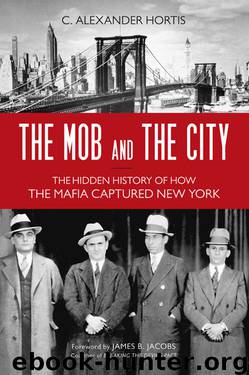The Mob and the City by C. Alexander Hortis

Author:C. Alexander Hortis
Language: eng
Format: epub
ISBN: 9781616149246
Publisher: Random House Publisher Services
Published: 2014-03-26T16:00:00+00:00
Mob front groups used similar tactics. In 1960, a member of an “Italian-American service organization,” identified as “William Bonanno, a wholesale food distributor from Tucson, Ariz.,” condemned the “stereotyping of Italian-Americans as gangsters,” which he said was “causing financial, social and moral damage to the whole Italian-American community.” Bonanno, the “food distributor,” was in fact a gangster who later peddled memoirs romanticizing his life in the Mafia.33
Criminal defense lawyers and mob front groups put the Department of Justice on the defensive with accusations of anti-Italian bias. “In the 1960s and 1970s, after we publicly entered the battle, the FBI was constantly attacked as being anti-Italian because of our efforts to break La Cosa Nostra,” said FBI agent Dennis Griffin. “Defense attorneys attacked me personally with this charge when I was on the witness stand testifying against Mob leaders.”34 Mafia boss Joseph Colombo formed the “Italian-American Civil Rights League” to protest outside the Manhattan office of the FBI. “Mafia, what's the Mafia?” said Colombo. “There is not a Mafia.” Cowed by the protests, Attorney General John Mitchell barred the Department of Justice from using the words “Mafia” and “Cosa Nostra.”35 Not everyone bought it though. State senator John Marchi denounced the Civil Rights League, saying, “Italian-Americans have been had.”36
Defending the Constitution
Other times, the mob's lawyers were defending important constitutional protections. After the media turned Frank Costello into a high-profile target, the police ran nonspecific, twenty-four-hour wiretaps not only on his home telephone, but on all pay phones in restaurants he frequented. Police then transcribed the conversations on the phones, whether Costello was a participant or not. Costello's attorney, Edward Bennett Williams, who read hundreds of these transcripts, explained the Fourth Amendment problems with this. “Husband-and-wife calls were monitored. The tender words of sweethearts were heard by a third ear. In short, hundreds of wholly innocent, law-abiding and unsuspecting citizens were deprived of their right to communicate privately,” recounted Williams. As Costello's attorney, Williams spent years challenging this and other due process issues, culminating in two appearances at the Supreme Court.37
Download
This site does not store any files on its server. We only index and link to content provided by other sites. Please contact the content providers to delete copyright contents if any and email us, we'll remove relevant links or contents immediately.
| African Americans | Civil War |
| Colonial Period | Immigrants |
| Revolution & Founding | State & Local |
Cat's cradle by Kurt Vonnegut(15351)
Pimp by Iceberg Slim(14506)
4 3 2 1: A Novel by Paul Auster(12391)
Underground: A Human History of the Worlds Beneath Our Feet by Will Hunt(12097)
The Radium Girls by Kate Moore(12026)
Wiseguy by Nicholas Pileggi(5782)
The Fire Next Time by James Baldwin(5440)
Perfect Rhythm by Jae(5402)
American History Stories, Volume III (Yesterday's Classics) by Pratt Mara L(5307)
Paper Towns by Green John(5188)
Pale Blue Dot by Carl Sagan(5007)
A Higher Loyalty: Truth, Lies, and Leadership by James Comey(4959)
The Mayflower and the Pilgrims' New World by Nathaniel Philbrick(4502)
The Doomsday Machine by Daniel Ellsberg(4489)
Killers of the Flower Moon: The Osage Murders and the Birth of the FBI by David Grann(4447)
The Sympathizer by Viet Thanh Nguyen(4390)
Too Much and Not the Mood by Durga Chew-Bose(4345)
The Borden Murders by Sarah Miller(4324)
Sticky Fingers by Joe Hagan(4197)
